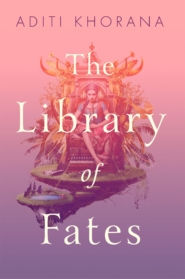Aditi Khorana, Author

Photo by Ericka Kreutz
In her TedTalk, “Harnessing the Power of the Unknown,” author Aditi Khorana explains how she gave up a structured, safe life to live without a net—aka, to become a writer. It didn’t quite go the way she envisioned at first. She spent a year and a half writing a manuscript that was rejected by publishers, which led to her spending quality time under a blanket on the couch watching Cosmos, listening to Neil deGrasse Tyson talk about parallel universes. A mere three months later, she had the draft of what would become her first published novel, Mirror in the Sky.
Khorana grew up in India, Denmark, and New England, and has worked as a journalist for ABC News, CNN, and PBS, and also as a marketing consultant for Fox, Paramount, and Sony. All of this life experience adds up to a unique, empowering, fierce body of work, including two novels, Mirror in the Sky and Library of Fates, and essays for Bustle and Seventeen. I sat down with the author in January at Semi-Tropic in Los Angeles’s Echo Park to find out more about the pros and cons of answering the call to be a writer, and the ways in which her life has transformed.
Louise Rozett: I have to ask about your time on the couch watching Cosmos after your manuscript was rejected. Your rise from the ashes of that experience is so phenomenal. What were you thinking and feeling during that time?
Aditi Khorana: Utter despair, and humiliation, and failure, and resignation, and more humiliation. I couldn’t have articulated it this way then, but, as an immigrant, I had this set of values instilled in me, and with those values came things that were culturally required. I had a home that I shared with a boyfriend, a successful career in the film industry—I knew I was supposed to be grateful and satisfied, but I was deeply unfulfilled. It was not an easy decision, but I walked out of that life. And the only thing that I had left that felt solid and tangible was this idea for a novel. So, when that crashed and burned, I felt like there was no path forward—it was just abject failure. The one thing that I did do during that time that helped was take food preservation classes and learn to make my own bread, cheese, yogurt, jams, and pickles. So, I ate well in my state of despair, I guess. When you’re writing a novel, you don’t get to feel a sense of reward for a long time, and I needed the satisfaction of making or creating something. Baking bread and making jam made me feel I had accomplished something useful.
LR: That’s interesting advice for writers who are working on novels. Since the gratification of the accomplishment is delayed, make sure you’re doing or creating something else that’s meaningful or useful to you.
AK: I firmly believe that if you’re an artist, you’re an artist in every area of your life—the way you live, the way you speak, the way you dress, the things you make, the way you interact with people—everything is a form of your art.
LR: Did answering the call to be a writer affect any of the important relationships in your life?
AK: Absolutely. But I think the message that women in this situation get is very different from the message that men get. It’s this idea that your relationships are the most important part of your life and the moment you choose to step into a position that’s going to empower you, the first thing that comes into question is your relationships. You feel pain in that moment and you question your decision. There are so many outside voices that are going to discourage you—most of the outside voices are going to discourage you, actually. You’re lucky if you have a handful of people who stick by you and I did; I had a good handful of friends. But there are a couple of people who are no longer in my life, and it’s for the best.
LR: What about your family?
AK: My family came around. I think my dad’s biggest fear in life is this idea of making art and therefore making yourself vulnerable in the world, and then having the world rip you and it apart. I believe that my dad’s instincts to discourage me were about his fear. Once I made the decision and told them I had to go through with this, they came on board and said, “Okay, we’re going to stand by you, witness you on this journey, and offer you emotional support.” It meant a lot and I think it made all the difference in that moment.
LR: What are the roots of your feminism? Is it rooted in your family at all?
AK: All my grandparents grew up on the border of Pakistan and Afghanistan, and when Partition happened in 1947, they came to India as teenagers. My grandmother found herself in a really unusual position at the time—she was one of the only people in the family who could find employment, and she worked in the office of an investment banker. In 1950s India, the idea of a woman going into a workplace every day was unheard of. While she was supporting her family, she met my granddad, and they fell in love. But they were from different castes, and spoke different languages, and their relationship was a huge scandal, so they eloped. Apparently, it was only after my mother was born a couple of years later that the family reluctantly came back together again. My grandmother continued to work her whole life—she was an incredibly independent figure, which of course had an impact on my mom, who also is one of the strongest forces of my life. I was raised by very strong, dynamic, charismatic women who were independent thinkers, and they’re a huge part of my feminist leanings. Also coming of age in Denmark in an international school and having access to different ways of being was really useful for me.
LR: What did it feel like to move from Denmark—one of the most progressive countries in the world—to an extremely wealthy, predominantly white suburb in America?
AK: It felt regressive. I worked at the local library as a teenager and I would make enough money to buy Metro North train passes. I would cut school and take the train into Manhattan and go to the Met, to the Guggenheim, to the NYU campus. I just felt that was a better education than what I was getting in the school system. I got caught and it was not great—there was a perception of me as a “model minority,” not a troublemaker, and my behavior was a shock for a lot of people. Yes, I was cutting school, but I was doing it to go to art museums! If I hadn’t had that, I’d be in a completely different place right now.
LR: No one thought to say, “Let’s just have her write a paper about what she saw at the museums and we’ll call it even?”
AK: No, because institutions are inherently antithetical to creativity and creative thinking. The structure is about penalizing, or turning you into a cautionary tale, which is probably why I’m working on a novel about Lilith right now. I’m fascinated by the cautionary tales and why someone becomes a cautionary tale.

LR: What has the learning curve been like for you from novel to novel? Are there aspects of your process that changed from Mirror in the Sky to Library of Fates, and from Library of Fates to the novel you’re writing now?
AK: It is different with every novel. I had no idea how to write a novel when I wrote Mirror. I had worked on that first manuscript that didn’t go anywhere, and Mirror was a novel written almost as a desperate cry. We don’t talk enough about desperation and humiliation as driving forces to make art. How do we harness and channel that feeling of desperation? None of us wants to feel it, or talk about it, but that was the place that Mirror came from. I wanted some sort of answer that couldn’t come from the outside world, it needed to come from within. There was no outlining for that book. I stayed up late nights, I wrote every day, and it was done in three months. It makes no sense to me to this day. Then with Library, I used the most elaborate notecard system you can think of, and it took a lot longer to write—it’s a very meticulously plotted book. And the novel I’m working on now about the Lilith myth has entirely consumed me—I’ve written two versions of it.
We don’t talk enough about desperation and humiliation as driving forces to make art. How do we harness and channel that feeling of desperation? None of us wants to feel it, or talk about it.
LR: Wait a minute. You’ve written two versions?
AK: In two completely different genres, from start to finish, both of which my agent was ready to sell. The first version was a very angry, contemporary novel, that I wrote after the 2016 election. Then I put it aside, even though it was ready to go out to market, because I felt it wasn’t quite right, it wasn’t what I wanted to put out in the world right now. Then I started from scratch and wrote a historical version in the language of Lilith in her own voice, and then scrapped that after I was done, again when it was ready to go out. Now I’m working on a third version which I think is the version, but I could be wrong. You just have to follow the thread and see where it takes you, which is hard.
LR: I am in awe of you writing three different versions! That’s spectacular.
AK: “Awe” is one word for it. Thank you for that.
LR: It says a lot about your commitment to discovering your vision, and what you’re willing to do in service of that discovery. I don’t think a lot of writers would have it in them to do that.
AK: For me, at this stage, I just want to discover what my own absolutely unadulterated original voice is, and the only way to do that is strip away all the layers, and the only way to do that is by writing and writing and writing. With every version, I could see who I’ve been influenced by, which authors, which artists. It’s not that you shouldn’t be influenced but every time I wrote a draft of it, I kept asking myself, what is my voice? What would it be independent of all of this? Especially since I’m telling a story about a character who has been erased by time—her story has been co-opted and told in a really unfair light. Who is the character without all of that adulteration? In order to figure that out, I had to figure out what my own voice is.
LR: That search for the unadulterated voice, the voice at its most powerful, reminds me of your Antioch lecture, “Fighting the Dangerous Narrative: Young Adult Fiction as Guerrilla Warfare.” You talked about The Odyssey as the YA lit of its time—which functioned as propaganda, designed to get men and boys geared up to fight and kill—and about how authors can actually use their voices to help readers conceive of a better world. How do we codify this? What is the positive version of propaganda?
AK: One of the reasons I give that talk about The Odyssey, and talk about these ideas to writers, is to give a broader context to the work that we’re doing. We’re not writing in a vacuum—what we write could potentially have a lasting impact for the next twenty-five, fifty, one-hundred, five-hundred years. We don’t know what’s going to stick around and what’s not. Of course, we all want to produce the best work possible, but how you get the message out—isn’t some part of that inevitably a little bit of marketing? Because of my marketing background, that’s the question I always come back to, and I don’t know what the answer is. But I’ve traveled around the world running focus groups and talking to people about narrative, and ultimately I don’t think it matters whether it’s high art or a Marvel film or something else—we need to focus on the messaging, and on what we’re offering to young people in particular.
LR: Do you find it unnerving to think that any time we’re writing something and putting our own socio-political views into it, we’re propagandizing?
AK: We need to subvert powerful propaganda—we can’t just shut it out and think of it as a bad thing. We need to study it for what it is, and use it to our ends. In guerrilla warfare, you use the same means, or a variation of the means, that the forces of hegemonic power are using, but you modify them to your needs. I don’t think there’s anything wrong with that. To not think of it that way is cheating yourself, and cheating an audience of people who need to be armed with story.
LR: Messaging and marketing aside, what are the questions you make a point of asking yourself when you write, perhaps about character, plot, or another literary element?
AK: I write pages and pages to figure out who my characters are—I will write up to twenty, thirty, forty pages on each character, things that won’t even go in the novel, like, who were the character’s parents, what were the experiences this character had, what was the biggest trauma in this character’s life? I treat them like real people, like friends I’m getting to know. And then all of that information makes it much easier to map their psychology onto a book. The actions that they take, the things that they say, the things that they do—it all feels natural because I know them so well. A character’s path becomes clear once you do that exploration, and it becomes much easier to write the book.
LR: Sometimes writerly exploration can be broadening, but it can also be overwhelming. Do you have any experience with writer’s block? If so, does the idea of writer’s block as a form of self-protection resonate with you in any way?
AK: Writer’s block is a self-protective mechanism that comes up when you’re at a point where you don’t want to confront something for some reason. For me, movement is always the answer. Whether I go for a walk, or go for a drive, or dance, movement will unlock whatever it is that I don’t want to address. It breaks up that rigidity, and creates safety and looseness that allows me to write again.
LR: To close, let’s talk about that great concept in Mirror in the Sky, the concept of “global FOMO” (fear of missing out), in which a worldwide pathology causes people to obsess over the possibility that their alternate selves—who exist on a planet called Terra Nova—are making better decisions and thus living better lives. What is the Aditi Khorana on Terra Nova doing with her life? And is there anything about her life that you envy or are relieved is not a part of your life on Earth?
AK: I think I’m leading my Terra Nova life right now. I no longer have FOMO in the way that I did back in that period of my life where I had the corner office, the big paycheck, the lovely home, and the lovely boyfriend yet was constantly asking myself, “is this it?” We’d go to Costco on the weekends and I would come home and have a meltdown and I couldn’t understand why. There is something about the rigidity of being a woman living at the crossroads of capitalism and patriarchy, where you always feel a little bit confined, like you’re running on a hamster wheel—you never feel like you’re enough, you never feel like you can catch up. I was always making lists—lists of things to buy, lists of things we needed to do, lists of I don’t even know what. My life is very different now. It’s run more by an internal clock than an external one, and an internal set of needs. I think we need to be reminded that heeding your internal calendar and clock might actually be the only answer FOMO. When you’re deeply embodied and rooted in your experience, when the depths are within, when you’ve excavated and navigated your own subterranean life, you stop wondering about other possible lives. Instagram still exists, people are still taking fancy vacations in Bali—that will always be there—but I don’t ever feel like I want to escape this life I have now.
Louise Rozett is the author of the Confessions series (Confessions of an Angry Girl, Confessions of an Almost-Girlfriend) published by HarlequinTEEN, and a pilot based on the series that won best half-hour original script at the Austin Film Festival. Her play Break, about the effects of the 9/11 recovery effort on the recovery workers and their families, was a finalist for the Stanley Drama Award, was workshopped at New York Stage & Film, and will be published by Broadway Play Publishing in 2020. She is a graduate of Vassar College and the MFA acting program at The Theatre School at DePaul University. Visit Louiserozett.com for more.





